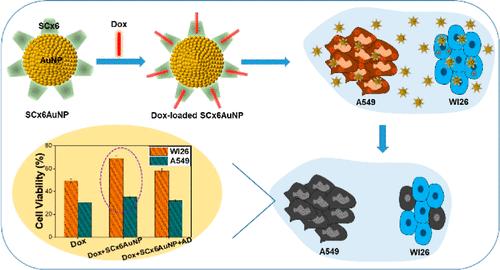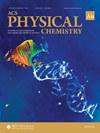p-Sulfonatocalix[6]arene-Functionalized Gold Nanoparticles: Applications in Drug Delivery and Bioimaging
IF 3.7
Q2 CHEMISTRY, PHYSICAL
引用次数: 0
Abstract
Surface-functionalized noble metal nanoparticles with macrocyclic hosts have attracted enormous research interest owing to their applications in drug delivery, catalysis, bioimaging, etc. Stable p-sulfonatocalix[6]arene-functionalized gold nanoparticles (SCx6AuNPs) of the sizes ∼7.5 nm have been synthesized and characterized by using UV–vis absorption, transmission electron microscopy, and surface-enhanced Raman spectroscopy measurements. The efficient uptake and stimuli-responsive release of doxorubicin (Dox), an anticancer drug, by the SCx6AuNPs have been established for targeted drug delivery application. The decreased cytotoxicity of Dox loaded on SCx6AuNPs, especially toward normal cell lines, and its multistimuli responsive release validated in both cancerous (A549) and normal (W126) cell lines find promising for selectively targeted drug delivery applications toward cancer cells. At the cellular level, this study also establishes the efficient uptake of the SCx6AuNP nanoconjugates, and its validation has been done by bioimaging measurement by using thioflavin T (ThT) dye loaded on to SCx6AuNPs instead of Dox as the fluorescent tracking probe. The bright fluorescence microscopic image of ThT-SCx6AuNP-stained cancerous cell lines corroborates the uptake of SCx6AuNPs by the cell lines and its projected utility for drug delivery and bioimaging applications.

对磺酰羰基六[6]炔功能化金纳米粒子:在药物输送和生物成像中的应用
具有大环宿主的表面功能化贵金属纳米粒子因其在药物输送、催化、生物成像等方面的应用而引起了广泛的研究兴趣。本研究合成了尺寸为 7.5 纳米的稳定的对磺酰基[6]炔功能化金纳米粒子(SCx6AuNPs),并通过紫外可见吸收、透射电子显微镜和表面增强拉曼光谱测量对其进行了表征。研究证实了 SCx6AuNPs 对抗癌药物多柔比星(Dox)的高效吸收和刺激响应释放,可用于靶向给药。负载在 SCx6AuNPs 上的 Dox 的细胞毒性降低,尤其是对正常细胞系,而且它在癌细胞(A549)和正常细胞(W126)中的多刺激响应释放都得到了验证,这为针对癌细胞的选择性靶向给药应用带来了希望。在细胞水平上,本研究还确定了 SCx6AuNP 纳米共轭物的高效吸收,并通过生物成像测量进行了验证,即使用负载在 SCx6AuNPs 上的硫黄素 T(ThT)染料代替 Dox 作为荧光跟踪探针。ThT-SCx6AuNP染色的癌细胞系的明亮荧光显微图像证实了细胞系对SCx6AuNPs的吸收及其在药物输送和生物成像应用中的预期效用。
本文章由计算机程序翻译,如有差异,请以英文原文为准。
求助全文
约1分钟内获得全文
求助全文
来源期刊
CiteScore
3.70
自引率
0.00%
发文量
0
期刊介绍:
ACS Physical Chemistry Au is an open access journal which publishes original fundamental and applied research on all aspects of physical chemistry. The journal publishes new and original experimental computational and theoretical research of interest to physical chemists biophysical chemists chemical physicists physicists material scientists and engineers. An essential criterion for acceptance is that the manuscript provides new physical insight or develops new tools and methods of general interest. Some major topical areas include:Molecules Clusters and Aerosols; Biophysics Biomaterials Liquids and Soft Matter; Energy Materials and Catalysis

 求助内容:
求助内容: 应助结果提醒方式:
应助结果提醒方式:


